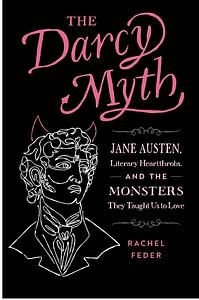Take a photo of a barcode or cover
143 reviews for:
The Darcy Myth: Jane Austen, Literary Heartthrobs, and the Monsters They Taught Us to Love
Rachel Feder
143 reviews for:
The Darcy Myth: Jane Austen, Literary Heartthrobs, and the Monsters They Taught Us to Love
Rachel Feder
elle_e_d_light's review against another edition
adventurous
challenging
hopeful
reflective
medium-paced
2.5
There are a lot of things here that do not make sense. Many parts of the argument rely upon a completely modern interpretation of a centuries-old text—and centuries-old laws/customs/etc—that seem reaching to the point of absurdity. Darcy is upholding the patriarchy for marrying off Lydia to her abuser for the sole reason of making Elizabeth less of an embarrassment to marry?! Mr. Bennet is upholding the patriarchy for not fighting inheritance laws so that his daughters inherit the house?! Mary and Mr. Collins were actually super intelligent?! What?
The author gives so many examples of Darcy-type characters over such a vastly different range of characters and personality types that the argument ends up amounting to basically everyone being a Darcy. Darcy is a Darcy, but somehow Wickham is also a Darcy?! The Beast from Beauty and the Beast is a Darcy/"I can fix him" despite the Beast very much being a "He fixed himself" character? Jake Gyllenhaal and Lord Byron are both Darcy? Why are we comparing real people to fictional character types like this? Also, all vampires are Lord Byron—from Dracula to Lestat to Edward Cullen—and therefore our attraction to vampires is actually an attraction to Lord Byron? Then what does that make Carmilla (who predates Dracula). Is she also Byron? Also, once again: it's weird to use a real life person—with very real life traumas and behavioral hangups—as a comparison point to fictional characters in this way. At least use the Byronic Hero instead of the actual Lord Byron.
Anyway, this book frustrated me greatly.
The author gives so many examples of Darcy-type characters over such a vastly different range of characters and personality types that the argument ends up amounting to basically everyone being a Darcy. Darcy is a Darcy, but somehow Wickham is also a Darcy?! The Beast from Beauty and the Beast is a Darcy/"I can fix him" despite the Beast very much being a "He fixed himself" character? Jake Gyllenhaal and Lord Byron are both Darcy? Why are we comparing real people to fictional character types like this? Also, all vampires are Lord Byron—from Dracula to Lestat to Edward Cullen—and therefore our attraction to vampires is actually an attraction to Lord Byron? Then what does that make Carmilla (who predates Dracula). Is she also Byron? Also, once again: it's weird to use a real life person—with very real life traumas and behavioral hangups—as a comparison point to fictional characters in this way. At least use the Byronic Hero instead of the actual Lord Byron.
Anyway, this book frustrated me greatly.
sabinsf99's review
informative
slow-paced
3.5
I'm really interested in digging into Jane Austen trivia and critique but I think this was too long for what can basically be summed up as, Darcy actually upheld patriarchy and we should all be aware of the insidious ways in which we have allowed the Darcy myth to take hold of all our lives.
wendypalmer's review
It’s a fun, pop-culture-oriented read, and looking at P&P through a Gothic horror lens is an interesting and innovative take, but I think it’s meant for a younger audience than me: it’s quite superficial and repetitive, it mostly ignores the wider historical context in favour of very modern interpretations, and really, while I think the “Darcy myth” concept is a real thing that needs examining, I’m not convinced that Darcy himself is the best example of the concept.
staykinduniversemike's review
funny
informative
reflective
medium-paced
4.25
Examing the tropes of mr darcy
s_gork's review
funny
informative
slow-paced
3.5
“I recognize that both romance and the Gothic are easy to dismiss because they are easily coded as feminine. And Jane Austen taught me to that shit seriously.”
First and foremost I loved the tone of this book. It was funny and relatable and the real life references to other works from Beauty and Beast to Sabrina Carpenter made all the author’s points so easy to relate to.
It was fun to take a cheeky look at how women’s literature has always been dismissed and looked down upon but how that same literature has immense cultural staying power and how it shapes our lives.
The line between hero and villain is thinner than you think.
First and foremost I loved the tone of this book. It was funny and relatable and the real life references to other works from Beauty and Beast to Sabrina Carpenter made all the author’s points so easy to relate to.
It was fun to take a cheeky look at how women’s literature has always been dismissed and looked down upon but how that same literature has immense cultural staying power and how it shapes our lives.
The line between hero and villain is thinner than you think.
